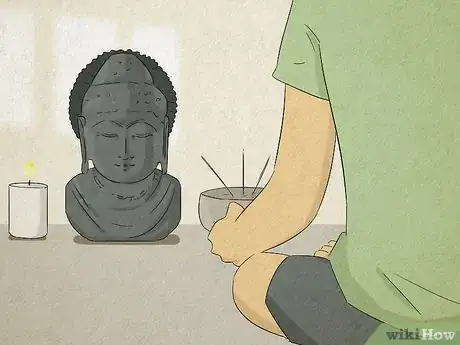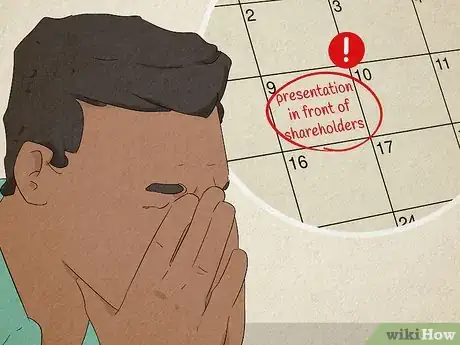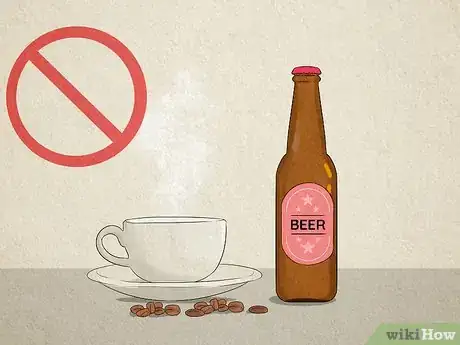This article was co-authored by Dale Prokupek, MD and by wikiHow staff writer, Hannah Madden. Dale Prokupek, MD is a board-certified Internist and Gastroenterologist who runs a private practice based in Los Angeles, California. Dr. Prokupek is also a staff physician at Cedars-Sinai Medical Center and an associate clinical professor of medicine at the Geffen School of Medicine at the University of California, Los Angeles (UCLA). Dr. Prokupek has over 30 years of medical experience and specializes in the diagnosis and treatment of diseases of the liver, stomach, and colon, including chronic hepatitis C, colon cancer, hemorrhoids, anal condyloma, and digestive diseases related to chronic immune deficiency. He holds a BS in Zoology from the University of Wisconsin – Madison and an MD from the Medical College of Wisconsin. He completed an internal medicine residency at Cedars-Sinai Medical Center and a gastroenterology fellowship at the UCLA Geffen School of Medicine.
There are 12 references cited in this article, which can be found at the bottom of the page.
wikiHow marks an article as reader-approved once it receives enough positive feedback. This article received 15 testimonials and 100% of readers who voted found it helpful, earning it our reader-approved status.
This article has been viewed 494,355 times.
If you deal with nerves or anxiety on the regular, you’re probably familiar with the feeling of a nervous stomach. Churning, cramping, and bloating are never easy to deal with, and they can often add to your sense of anxiety. Fortunately, there are a few ways you can learn to manage your nervousness and calm your stomach down to conquer your worries.
Steps
Expert Q&A
Did you know you can get premium answers for this article?
Unlock premium answers by supporting wikiHow
-
QuestionWhat are some signs that something may actually be wrong?
 Dale Prokupek, MDDale Prokupek, MD is a board-certified Internist and Gastroenterologist who runs a private practice based in Los Angeles, California. Dr. Prokupek is also a staff physician at Cedars-Sinai Medical Center and an associate clinical professor of medicine at the Geffen School of Medicine at the University of California, Los Angeles (UCLA). Dr. Prokupek has over 30 years of medical experience and specializes in the diagnosis and treatment of diseases of the liver, stomach, and colon, including chronic hepatitis C, colon cancer, hemorrhoids, anal condyloma, and digestive diseases related to chronic immune deficiency. He holds a BS in Zoology from the University of Wisconsin – Madison and an MD from the Medical College of Wisconsin. He completed an internal medicine residency at Cedars-Sinai Medical Center and a gastroenterology fellowship at the UCLA Geffen School of Medicine.
Dale Prokupek, MDDale Prokupek, MD is a board-certified Internist and Gastroenterologist who runs a private practice based in Los Angeles, California. Dr. Prokupek is also a staff physician at Cedars-Sinai Medical Center and an associate clinical professor of medicine at the Geffen School of Medicine at the University of California, Los Angeles (UCLA). Dr. Prokupek has over 30 years of medical experience and specializes in the diagnosis and treatment of diseases of the liver, stomach, and colon, including chronic hepatitis C, colon cancer, hemorrhoids, anal condyloma, and digestive diseases related to chronic immune deficiency. He holds a BS in Zoology from the University of Wisconsin – Madison and an MD from the Medical College of Wisconsin. He completed an internal medicine residency at Cedars-Sinai Medical Center and a gastroenterology fellowship at the UCLA Geffen School of Medicine.
Board Certified Internist & Gastroenterologist Blood in your stool is the really big one. If you're bleeding it could be a serious sign. Keep in mind that blood in your stool could be bright red, or black and tarry depending on where you're bleeding. Pus and mucus in your stool can be a concerning sign as well. Then there are the obvious concerns, like vomiting or a fever. You should see a doctor if any of these apply to you.
Blood in your stool is the really big one. If you're bleeding it could be a serious sign. Keep in mind that blood in your stool could be bright red, or black and tarry depending on where you're bleeding. Pus and mucus in your stool can be a concerning sign as well. Then there are the obvious concerns, like vomiting or a fever. You should see a doctor if any of these apply to you. -
QuestionHow do I calm myself down before a performance?
 Chris M. Matsko, MDDr. Chris M. Matsko is a retired physician based in Pittsburgh, Pennsylvania. With over 25 years of medical research experience, Dr. Matsko was awarded the Pittsburgh Cornell University Leadership Award for Excellence. He holds a BS in Nutritional Science from Cornell University and an MD from the Temple University School of Medicine in 2007. Dr. Matsko earned a Research Writing Certification from the American Medical Writers Association (AMWA) in 2016 and a Medical Writing & Editing Certification from the University of Chicago in 2017.
Chris M. Matsko, MDDr. Chris M. Matsko is a retired physician based in Pittsburgh, Pennsylvania. With over 25 years of medical research experience, Dr. Matsko was awarded the Pittsburgh Cornell University Leadership Award for Excellence. He holds a BS in Nutritional Science from Cornell University and an MD from the Temple University School of Medicine in 2007. Dr. Matsko earned a Research Writing Certification from the American Medical Writers Association (AMWA) in 2016 and a Medical Writing & Editing Certification from the University of Chicago in 2017.
Family Medicine Physician
-
QuestionI have functional dyspepsia, and I feel slightly sick to my stomach all the time. Any advice?
 Chris M. Matsko, MDDr. Chris M. Matsko is a retired physician based in Pittsburgh, Pennsylvania. With over 25 years of medical research experience, Dr. Matsko was awarded the Pittsburgh Cornell University Leadership Award for Excellence. He holds a BS in Nutritional Science from Cornell University and an MD from the Temple University School of Medicine in 2007. Dr. Matsko earned a Research Writing Certification from the American Medical Writers Association (AMWA) in 2016 and a Medical Writing & Editing Certification from the University of Chicago in 2017.
Chris M. Matsko, MDDr. Chris M. Matsko is a retired physician based in Pittsburgh, Pennsylvania. With over 25 years of medical research experience, Dr. Matsko was awarded the Pittsburgh Cornell University Leadership Award for Excellence. He holds a BS in Nutritional Science from Cornell University and an MD from the Temple University School of Medicine in 2007. Dr. Matsko earned a Research Writing Certification from the American Medical Writers Association (AMWA) in 2016 and a Medical Writing & Editing Certification from the University of Chicago in 2017.
Family Medicine Physician
References
- ↑ https://patient.info/digestive-health/indigestion-medication/antacids
- ↑ https://health.clevelandclinic.org/ginger-ale-and-saltine-crackers-5-ways-to-ease-stomach-pain-and-nausea/
- ↑ https://www.health.harvard.edu/blog/ease-anxiety-and-stress-take-a-belly-breather-2019042616521
- ↑ https://healthblog.uofmhealth.org/wellness-prevention/using-music-times-of-anxiety
- ↑ https://health.clevelandclinic.org/stomach-churning-may-gut-stress/
- ↑ https://www.mayoclinic.org/healthy-lifestyle/adult-health/in-depth/friendships/art-20044860
- ↑ https://www.urmc.rochester.edu/encyclopedia/content.aspx?ContentID=4552&ContentTypeID=1
- ↑ https://adaa.org/learn-from-us/from-the-experts/blog-posts/consumer/how-calm-anxious-stomach-brain-gut-connection
- ↑ https://adaa.org/learn-from-us/from-the-experts/blog-posts/consumer/how-calm-anxious-stomach-brain-gut-connection
- ↑ https://adaa.org/learn-from-us/from-the-experts/blog-posts/consumer/how-calm-anxious-stomach-brain-gut-connection
- ↑ https://www.mayoclinic.org/healthy-lifestyle/consumer-health/in-depth/mindfulness-exercises/art-20046356
- ↑ https://health.clevelandclinic.org/stomach-churning-may-gut-stress/
- ↑ https://www.mayoclinic.org/tests-procedures/meditation/in-depth/meditation/art-20045858
- ↑ https://www.health.harvard.edu/blog/nutritional-strategies-to-ease-anxiety-201604139441
- ↑ https://www.nhs.uk/live-well/eat-well/five-lifestyle-tips-for-a-healthy-tummy/
- ↑ https://health.clevelandclinic.org/stomach-churning-may-gut-stress/
About This Article
To calm a nervous stomach, first try taking a deep breath in through your nose and breathing out through your mouth to help you relax. Taking a warm bath or listening to soothing music can also help calm you down and soothe your stomach. Certain medicines like Pepto Bismol and Tums might provide some relief, as well as lozenges with mint or ginger in them. However, you should avoid caffeine, alcohol, and heavy meals, as they can make your stomach hurt worse. If you get a nervous stomach often, consider trying yoga, meditation, exercise, and journaling to lower your anxiety levels over time. To learn more from our Gastroenterologist co-author, like how to know when something's actually wrong with your stomach, keep reading!















































































Medical Disclaimer
The content of this article is not intended to be a substitute for professional medical advice, examination, diagnosis, or treatment. You should always contact your doctor or other qualified healthcare professional before starting, changing, or stopping any kind of health treatment.
Read More...